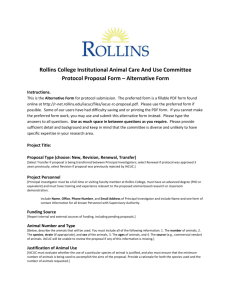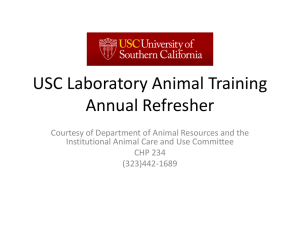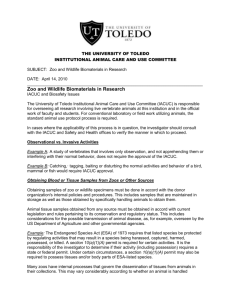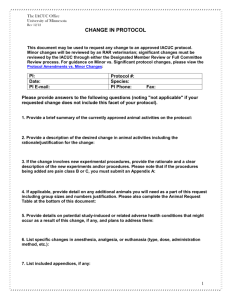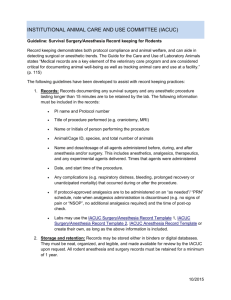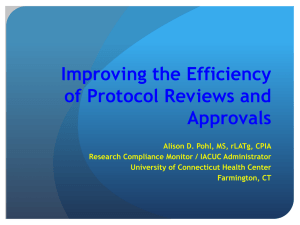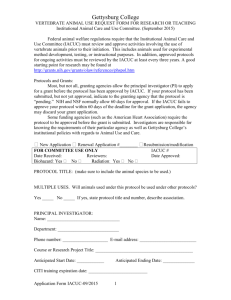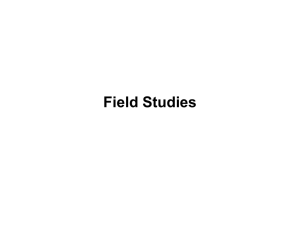KSU Assurance of Compliance 021112
advertisement
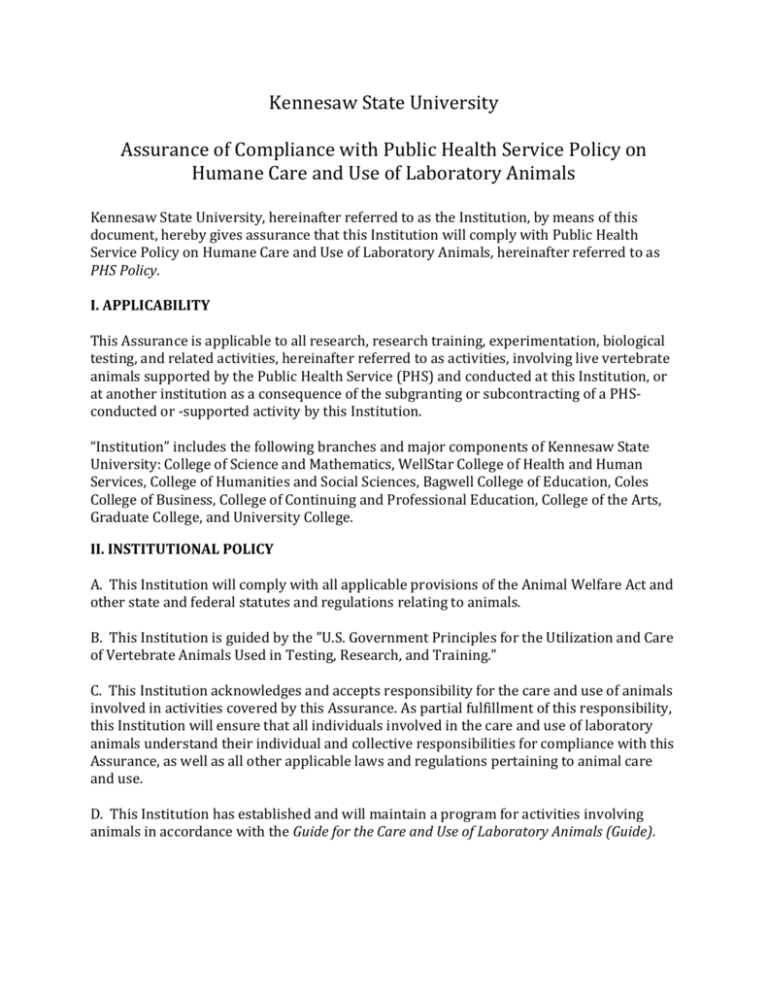
Kennesaw State University Assurance of Compliance with Public Health Service Policy on Humane Care and Use of Laboratory Animals Kennesaw State University, hereinafter referred to as the Institution, by means of this document, hereby gives assurance that this Institution will comply with Public Health Service Policy on Humane Care and Use of Laboratory Animals, hereinafter referred to as PHS Policy. I. APPLICABILITY This Assurance is applicable to all research, research training, experimentation, biological testing, and related activities, hereinafter referred to as activities, involving live vertebrate animals supported by the Public Health Service (PHS) and conducted at this Institution, or at another institution as a consequence of the subgranting or subcontracting of a PHSconducted or -supported activity by this Institution. “Institution” includes the following branches and major components of Kennesaw State University: College of Science and Mathematics, WellStar College of Health and Human Services, College of Humanities and Social Sciences, Bagwell College of Education, Coles College of Business, College of Continuing and Professional Education, College of the Arts, Graduate College, and University College. II. INSTITUTIONAL POLICY A. This Institution will comply with all applicable provisions of the Animal Welfare Act and other state and federal statutes and regulations relating to animals. B. This Institution is guided by the ”U.S. Government Principles for the Utilization and Care of Vertebrate Animals Used in Testing, Research, and Training.” C. This Institution acknowledges and accepts responsibility for the care and use of animals involved in activities covered by this Assurance. As partial fulfillment of this responsibility, this Institution will ensure that all individuals involved in the care and use of laboratory animals understand their individual and collective responsibilities for compliance with this Assurance, as well as all other applicable laws and regulations pertaining to animal care and use. D. This Institution has established and will maintain a program for activities involving animals in accordance with the Guide for the Care and Use of Laboratory Animals (Guide). III. INSTITUTIONAL PROGRAM FOR ANIMAL CARE AND USE A. LINES OF AUTHORITY AND RESPONSIBILITY FOR ADMINISTERING THE PROGRAM AND ENSURING COMPLIANCE WITH THIS POLICY The President of Kennesaw State University (Dr. Daniel S. Papp) delegated authority through the Vice President for Research (Dr. Charles Amlaner) to serve as the Institutional Official (IO). The Institutional Animal Care and Use Committee (IACUC) and Veterinarian report directly to the IO. Members of the IACUC are appointed by the IO per a formal letter designating this responsibility from the President. The IACUC oversees the Institution’s animal care and use program, facilities, and approved procedures. The IACUC advises the IO about problems or deficiencies and recommends steps for correction. The IACUC reviews all animal use protocols for consideration of humane animal care and use and performs semiannual reviews of the animal care and use program and facilities as required by federal regulations and Kennesaw State University policy. Dr. Marcus C. Davis (Assistant Professor of Biology, Department of Biology & Physics) serves as Chair of Kennesaw State University’s IACUC. B. VETERINARIAN The Veterinarian, Dr. James C. Davis, DVM, graduated from Ross University School of Veterinary Medicine in 2001. Dr. Davis completed his final year of clinical training at The University of Georgia, and has prior experience in the animal medical sciences. His specializations include ultrasonography, orthopedic surgery, dermatology and urology. Dr. Davis will work as a consultant in conjunction with the IACUC and faculty to assure that care and use of live vertebrate animals covered by IACUC-approved protocols are carried out to the highest programmatic standards and quality possible, and in full compliance with federal, state, and local laws and regulations, as well as Institutional policies and procedures. C. INSTITUTIONAL ANIMAL CARE 8: USE COMMITTEE CONSTITUTED IN ACCORDANCE WITH PHS POLICY The Institutional Animal Care and Use Committee (IACUC) at this Institution is properly appointed in accordance with the PHS Policy IV.A.3.a and is qualified through the experience and expertise of its members to oversee the Institution's animal care and use program and facilities. The IACUC consists of at least five members, and its membership meets the composition requirements set forth in the PHS Policy IV.A.3.b. D. RESPONSIBILITIES OF THE INSTITUTIONAL ANIMAL CARE AND USE COMMITTEE 1. REVIEW PROGRAM AT LEAST SEMIANNUALLY The IACUC will review at least once every six months the Institution's program for humane care and use of animals, using the Guide as a basis for evaluation. The semiannual program review also includes evaluation of the following: IACUC membership and functions; IACUC protocol review practices; IACUC records and reporting requirements; Veterinary care, including preventive medicine, animal procurement, transportation, surgery, pain, distress, analgesia and anesthesia, euthanasia, and drug storage and control; Research personnel qualifications and training; and Occupational health and safety of personnel. The entire membership of the IACUC participates in the program review evaluation and discussion at a convened meeting of the committee. Recommended changes, if any, are passed by majority vote and the Committee documents any resulting programmatic changes. In the event of a substantive programmatic change recommendation, a subcommittee of the IACUC may be appointed by the Chair to further investigate the recommendation and report back to the full IACUC for a determination. The IO is notified in this case. 2. INSPECT FACILITIES AT LEAST SEMIANNUALLY The IACUC will inspect at least once every six months all of the Institution's animal facilities, including satellite facilities, using the Guide as a basis for evaluation. The IACUC procedures for conducting semiannual facility inspections are as follows: At least once every six months, the IACUC inspects all Institutional facilities where animals are housed and/ or used. A minimum of two voting members of the committee must comprise an inspection team. The IACUC utilizes the Guide and the Animal Welfare Act as the principal guiding documents in conducting the inspections. Areas inspected include central animal housing facilities and related facilities such as, but not limited to, cage wash, aseptic surgery, procedure areas, necropsy, supplies and inventory storage, controlled substance storage and records, surgical suites, and recovery areas. No IACUC member wishing to participate in any review or inspection shall be excluded. The subcommittee may invite ad hoc consultants to assist in the reviews and inspections. 3. PROVIDE REPORTS TO INSTITUTIONAL OFFICIAL Prepare reports of the IACUC evaluations as set forth in the PHS Policy IV.B.3 and submit the reports to the IO. The IACUC procedures for developing reports and submitting them to the IO are as follows: Upon completion of the semiannual animal program and facilities reviews, the inspection teams prepare a written report. The report shall describe the Institution’s adherence to the Guide and the Animal Welfare Act and any deficiencies found. Reports are distributed to all members of the IACUC for their review and discussion at a convened meeting of the committee where a quorum is present. The reports must be signed by a majority of the members of the IACUC and shall include minority views, if any. The IACUC shall submit the signed semiannual report to the IO. The report shall be made available to USDA, OLAW, and any federal funding agencies upon request. Deficiencies or departures from PHS Policy and the Guide identified during review are categorized as either minor or significant, and they are so described in the written report. A significant deficiency is defined by USDA Regulations and PHS Policy as something that is or may be a significant threat to animal health or safety; such deficiencies require immediate attention and resolution. The report shall include a plan and schedule with dates for correction of each program or facility deficiency. IACUC shall coordinate with the researcher or other responsible party on resolving the deficiency. Resolution may require notification of facilities management personnel, identification of resources (i.e., funding), and follow-up by the IACUC. Any failure to adhere to the plan and correction schedule that results in a significant deficiency remaining uncorrected shall be reported by the IACUC through the IO within 15 days, in writing and as appropriate, to the Office of Laboratory Animal Welfare (OLAW). If the activity is federally funded, the relevant agency shall also be informed. 4. REVIEW OF CONCERNS INVOLVING USE OF ANIMALS The IACUC will review concerns involving the care and use of animals at the Institution. The IACUC procedures for reviewing concerns are as follows: Anyone with a concern about any aspect of animal care and use at Kennesaw State University or who wants to express a complaint about how animals are being treated is encouraged to contact the Institutional Official (IO), the IACUC Chair, or any IACUC member. Concerns may also be emailed to iacuc@kennesaw.edu. Detailed contact information and instructions for raising concerns are provided at http://www.kennesaw.edu/iacuc/. This information is also prominently posted in all central animal facilities. The IACUC will investigate any animal care and use concern, even if submitted anonymously. No adverse action will be taken against anyone making a goodfaith report. No Institute employee, committee member, student, or other person shall be discriminated against or be subject to any reprisal for reporting, in good faith, concerns or violations of regulations or standards under the Animal Welfare Act. Persons with no formal relationship with the Institution are also encouraged to register their concerns, also without fear of reprisal or future discrimination. The IACUC Chair, at least one other IACUC member and, as necessary, the consulting Veterinarian will meet with the individuals against whom a complaint or concern is lodged. The purpose of this discussion is to allow the researcher an opportunity to respond to the claim and to clarify any misunderstanding. If the claim is found to have merit, the IACUC may further investigate and/or appoint a sub-committee of members to do so. The IACUC will consult with the IO to ensure that the rights and reputation of the accused individuals are protected. Such complaints and concerns are communicated immediately to the IO by the IACUC Chair and/or consulting Veterinarian. Any suspension of an activity involving animals shall be immediately reported by the IO to the Office of Laboratory Animal Welfare and, as appropriate, the federal agency funding the activity. 5. MAKE WRITTEN RECOMMENDATIONS TO INSTITUTIONAL OFFICIAL The IACUC will make Written recommendations to the IO regarding any aspect of the Institution's animal program, facilities, or personnel training. The procedures for making recommendations to the IO are as follows: Recommendations are made to the IO in the semiannual reports as described above and at semiannual meetings of the IO and the IACUC. If the IACUC has recommendations at other times of the year, or concerning matters not covered on the semiannual reports they are made in the form of a letter to the IO. 6. PROCESS FOR IACUC TO REVIEW, APPROVE, REQUIRE MODIFICATIONS FOR PROTOCOL APPROVAL In accord with the PHS Policy IV.C.l—3, the IACUC shall review and approve, require modifications in (to secure approval), or withhold approval of PHS-supported activities related to the care and use of animals. A. PRINCIPAL INVESTIGATOR PREPARES AND SUBMITS PROTOCOL The following describes the steps taken by the Principal Investigator to apply for IACUC approval. 1) ANIMAL CARE AND USE PROTOCOL (ACUP) FORM: The PI must fully complete an ACUP form. The online form is available on the IACUC webpage at http://www.kennesaw.edu/iacuc/ 2) STATEMENT OF WORK OR PROJECT DESCRIPTION: If external funding is associated with this protocol, a copy of the funding proposal or final grant pages sent to the funding agency must be sent to the IACUC along with the ACUP form. Federal regulations require the IACUC to compare the protocol to the funding proposal Statement of Work or Project Description. Substantive differences must be satisfactorily addressed prior to IACUC approval. 3) REQUIRED TRAINING: Everyone named on the protocol (including students, post-docs, lab techs, Visiting Scholars, and affiliates) is required to complete the online training course, “Working with the IACUC”. Online training is available through the Collaborative Institutional Training Initiative (CITI) web-based training program (http://www.citiprogram.org/). The program consists of a basic course of modules for biomedical research, social/behavioral research, and student research. Please consult with the IACUC administrator (iacuc@kennesaw.edu) for more information on the appropriate training modules for a specific research or teaching program. The certification must be renewed every three years. 4) DEPARTMENTAL SIGN OFF: The completed ACUP form is to be signed by the applicant’s department head or, in lieu of a written signature, department heads may send an email to iacuc@kennesaw.edu stating that they are aware of the proposed work and concur with its submittal to the IACUC. When the department chair is the Principal Investigator named in the ACUP, no other sign-off is required. 5) PRELIMINARY ACUP SUBMISSION: The ACUP Form and funding attachments should be submitted to the IACUC via email to iacuc@kennesaw.edu. 6) FINAL PROTOCOL SUBMISSION: If ACUP modification or amendments are required, the PI should modify the protocol in accordance with the IACUC Chair and consulting Veterinarian and then submit the modified ACUP to the IACUC via email to iacuc@kennesaw.edu for distribution to the committee. B. ADMINISTRATIVE PROCESSING OF PROTOCOLS Upon receipt of an ACUP application, the IACUC follows this process to facilitate protocol review. (If the submission is a modification or amendment, a three-year renewal, or annual continuation application for an existing ACUP, virtually the same steps are followed). 1) PROTOCOL TRACKING: Applications are assigned an IACUC number and logged into the database. Revisions, amendments and continuing review applications are linked to the relevant ACUP and logged into the database. 2) INITIAL REVIEW: The application will be given a preliminary review by the IACUC Chair to confirm that applications are complete and compare the proposed research procedures to those described in the funding proposal, if any. Completion of appropriate educational modules for each named member of the research team will also be verified. Final IACUC approval will be withheld until these requirements are satisfied. 3) VETERINARY CONSULTATION: If compliant, a consultation with the Veterinarian is scheduled. The Veterinarian will contact the PI for discussion, clarification, or additional information as necessary. Following veterinary consultation, the ACUP will be returned to the PI for modifications, if necessary. If none are needed, the Veterinarian will inform the IACUC Chair and the ACUP application will be forwarded to the IACUC committee. 4) PROTOCOL DISTRIBUTION TO COMMITTEE: After the ACUP application has undergone administrative and veterinary review and has been revised and resubmitted by the PI, it is distributed to all members of the IACUC. IACUC members must respond within a certain number of days regarding their call for full committee review or their recommendation of approval. If a committee member calls for full committee review, then the protocol will be placed on the agenda for the next scheduled IACUC meeting, unless it was received without sufficient lead-time. On a case-by-case basis and based on researcher justification, a special meeting may be called to expedite full committee review of an ACUP protocol. Researchers should contact the IACUC well in advance of ACUP submission to coordinate their submission date with the current IACUC meeting schedule. C. COMMITTEE REVIEW PROCESS 1) FULL COMMITTEE REVIEW AT CONVENED MEETING OF COMMITTEE All applications requested for full committee review (new protocols, annual continuing review, three-year renewals, or modification and amendments) are considered for approval during regularly scheduled meetings of the IACUC with a quorum present. Occasionally, the PI will be invited to take questions from the IACUC at a convened meeting. The PI will leave the room during deliberations and vote. 2) IACUC MEETINGS Institutional Animal Care and Use Committee meetings are conducted in the manner described here. a) MEETING SCHEDULE: The IACUC will meet at least every third month (quarterly - every 12 weeks), depending on the holiday schedule and whether there are matters to consider. Additional meetings will be called if necessary for the Committee to fulfill its responsibilities. b) QUORUM: A quorum is required at any meeting at which formal action is taken by the IACUC. Any formal action taken by the IACUC (i.e. approval, suspension) must be approved by majority vote at a convened meeting with a quorum of IACUC members. A simple majority of the current members of the IACUC constitutes a quorum. If a quorum is lost at any time during the meeting, no further formal action will be taken until a quorum is attained. Any member who has a conflict of interest in a matter under consideration by the IACUC shall not be counted for establishing a quorum for that portion of the meeting. c) USE OF TELECOMMUNICATIONS FOR IACUC MEETINGS: Through use of telecommunications (e.g., telephone- or video-conferencing), the Institution’s IACUC may conduct official business without all members physically present. 3) DETERMINATIONS MADE BY MAJORITY VOTE AT CONVENED MEETING WITH QUORUM When full committee review of a protocol is undertaken, a meeting will be held with attendance by a quorum of voting members. Although the committee strives for consensus, majority rule will apply. IACUC determinations, reached by the full committee, shall result in the protocol application (or other action) being assigned to one of the following categories: A. APPROVED: The application is approved as presented with no modifications required. The IACUC will issue an approval letter to the PI. If the project is funded by an external agency, a copy of the approval letter will be provided to the Office of Grants and Contracts (OGC). OGC bears the responsibility for forwarding the IACUC approval information to the sponsor. While protocols may be valid for three years, continuing review is required on at least an annual basis, and always at the end of years one and two. B. APPROVED PENDING CLARIFICATION OR MODIFICATION: Clarifications or minor modifications are required for approval. The PI will be notified in writing, either by email or letter, of any required clarification or modification. The Chair or another designated IACUC member will review the response to determine whether it is satisfactory; if so, IACUC will issue the approval letter. C. TABLED: The IACUC requires substantial additional information and/or has a significant concern. The IACUC shall notify the PI by email of the decision and will offer the PI an opportunity to discuss the protocol. When circumstances warrant, the Chair may call the PI to discuss the review. Before IACUC review will continue, the Pl must submit a modified application clearly identifying changes from the tabled application. D. DISAPPROVED: The IACUC will notify the PI in writing when an application is disapproved and will provide the basis for the committee's decision. When circumstances warrant, the Chair may call the PI to discuss the review. If a protocol is disapproved, the PI has the right of appeal to the IACUC. The IACUC may, at its discretion, obtain external review of the application by a PHS- approved IACUC of an equivalent institution and/or by expert consultants in the field of that research. The Kennesaw State University IACUC, however, shall be the final authority in determining the acceptability of the protocol. A “disapproval” determination by the IACUC may not be overruled by any officer or employee. 7. PROPOSED CHANGES REGARDING THE USE OF ANIMALS IN ONGOING ACTIVITIES Amendments to an existing ACUP must be reviewed and approved by the IACUC before the changes are implemented. The administrative and committee review process is virtually identical to that for new protocols, described above. Changes made to a protocol may be categorized as one of two types, significant or minor. A. SIGNIFICANT CHANGES OR MODIFICATIONS Significant changes follow the same procedures as new proposals (above) and may require full committee review at a convened meeting. The following actions (identified by the Office of Laboratory Animal Welfare as significant) generally require approval by the full committee: change in objectives of a study; proposals to switch from non-survival to survival surgery; change in degree of invasiveness of a procedure or discomfort to an animal; change in species or in the approximate number of animals used; change in anesthetic agent(s) or in the withholding of analgesics; change in methods of euthanasia; change in duration, frequency or number of procedures performed on an animal; and change in Principal Investigator (PI). B. MINOR CHANGES OR MODIFICATIONS Those actions that have no effect on the humane care and use of laboratory animals may be administratively reviewed and approved by the IACUC Chair and a delegated subcommittee of IACUC members (minimum of 2 members plus the Chair). These include changes in personnel (other than the PI or co-PI), change in protocol title, and change in funding source. If the change in funding source includes any additional or different procedures, the amendment shall be distributed to the full committee for consideration. Revisions to an existing protocol do not extend the current approval period. 8. NOTIFY INVESTIGATORS OF IACUC DETERMINATIONS The IACUC will notify investigators and the Institution in writing of its decision to approve or withhold approval of those activities related to the care and use of animals, or of modifications required to secure IACUC approval as set forth in the PHS Policy IV.C.4. The IACUC procedures to notify investigators and the Institution of its decisions regarding protocol review are as follows: The IACUC Office sends the PI an email on the status of the protocol following review. 9. CONTINUING REVIEW The IACUC shall conduct continuing review of each previously approved, ongoing activity covered by PHS Policy at appropriate intervals as determined by the IACUC, including a complete review in accordance with the PHS Policy IV. C.1—4 at least once every three years. The IACUC procedures for conducting continuing reviews are as follows: A. ANNUAL REVIEW All continuing protocols are reviewed by the IACUC at least annually. The purpose of continuing review is to inform the IACUC of the current status of the project; to ensure continued compliance with PHS, USDA and institutional requirements; and to provide for re-evaluation of the animal activities at appropriate intervals. The IACUC emails the PI Continuing Review/ Progress Report form at least two months prior to the protocol anniversary date. Regardless of this reminder service, it is the responsibility of the PI to ensure that continuation documents are submitted in sufficient time for review prior to protocol approval expiration. The PI must complete and return the Continuing Review/ Progress Report form to the IACUC at least one month prior to expiration. If the PI fails to timely complete and return the Continuing Review form, IACUC approval expires on the anniversary date, and no further activities can be conducted with animals until the IACUC reinstates the protocol. In the rare event that a continuing review application documents no animal usage in the past twelve months and no change in the protocol since its most recent approval, the Chair shall have the authority to review and grant continuing approval. In this case, animals must not have been procured, there can be no proposed deviations from the original protocol, and the renewal must be for year 2 or 3. Projects conducted entirely off-campus are also required to undergo continuing review at least annually. The Kennesaw State University IACUC will accept as evidence of continuing approval a copy of the approved continuation letter from the Assured off-campus institution. Federal regulations require that Institutional Animal Care and Use Committee protocols be closed at the end of three years. If the work is to continue beyond the third year, an entirely new protocol—with veterinary consultation—must be submitted for IACUC approval. B. THREE YEAR RENEWAL If a protocol will continue beyond the third year, the PI must submit a complete new application, including a veterinary consultation, to the Office of Research Compliance prior to the three-year anniversary date. The IACUC will conduct a review, as for any new application and following the process described herein. 10. PROCEDURES USED TO SUSPEND AN ACTIVITY INVOLVING ANIMALS The IACUC is authorized to suspend an activity involving animals as set forth in the PHS Policy IV.C.6. The IACUC procedures for suspending an ongoing activity are as follows: The IACUC may suspend a protocol at any time if it determines that the activity is not being conducted in accordance with the protocol approved by the IACUC or not in accordance with the guidance from the AWA, PHS Policy, the Guide, or Kennesaw State University’s Assurance or policies. Suspension of a protocol requires a majority vote of IACUC members at a Full Committee meeting with a quorum of members attending. Such meetings may be held via teleconference to ensure a swift and appropriate response to serious concerns. As an exception to the above: The Veterinarian can suspend a protocol on an emergency basis. The Veterinarian has the authority to suspend any protocol that does not follow AWA, PHS Policy, the Guide, or Kennesaw State University’s Assurance or policies. The Veterinarian is authorized, in extreme situations, to confiscate animals, remove them from the control of the PI, treat animals, and/or euthanize them, pending an inquiry or investigation. Any such suspension will immediately be reported to the IO and the IACUC and will be the subject of a called meeting with a quorum of committee members. The IACUC may additionally impose a period of suspension for some or all individual’s ability to use animals until it is clear that the personnel and procedures have been brought into compliance with federal and Kennesaw State University policies and guidance. The individuals involved may be subject to further disciplinary action by the institution. The IO will notify the Office of Laboratory Animal Welfare (OLAW) immediately by telephone or email. The IACUC will then prepare for the IO’s signature a written notification to OLAW and any other appropriate federal agency. IV. INSTITUTIONAL STATUS As specified in PHS Policy IV.A.2, as a Category 2 institution, all of Kennesaw State University’s programs and facilities, including satellite facilities, for activities involving animals have been evaluated by the IACUC and will be reevaluated by the IACUC at least once every six months in accord with PHS Policy IV.B.1 and IV.B.2. All reports have been prepared in accord with PHS Policy IV.B.3. All IACUC semiannual reports will include a description of the nature and extent of this institution’s adherence to the Guide. Any departures from the Guide will be identified specifically and reasons for each departure will be stated. Reports will distinguish significant deficiencies from minor deficiencies. Where program or facility deficiencies are noted, reports will contain a reasonable and specific plan and schedule for correcting each deficiency. Semiannual reports of the IACUC evaluations will be submitted to the IO. Semiannual reports of IACUC evaluations will be maintained by this institution and made available to the Office of Laboratory Animals Welfare (OLAW) upon request. Kennesaw State University operates under Category 2 – not accredited by the Association for Assessment and Accreditation of Laboratory Animal Care, International (AAALAC). The report of the most recent semiannual report of the IACUC is attached. V. RECORDKEEPING REQUIREMENTS A. RECORDS MAINTAINED AT LEAST THREE YEARS The Institution will maintained for at least three years: A copy of this Assurance and any modifications thereto, as approved by the PHS. Minutes of the IACUC meetings, including records of attendance, activities of the committee, and committee deliberations. Records of applications, proposals, and proposed significant changes in the care and use of animals and whether IACUC approval was given or withheld. Records of semiannual IACUC reports and recommendations (including minority views) forwarded to the IO. Records of accrediting body determinations. B. ADDITIONAL RECORDS MAINTENANCE The Institution will maintain record that relate directly to applications, proposals, and proposed changes in ongoing activities reviewed and approved by the IACUC for the duration of the activity and for an additional three years after completion of the activity. C. AVAILABILITY OF RECORDS FOR INSPECTION AND COPYING All records shall be accessible for inspection and copying by authorized OLAW or other PHS representatives at reasonable times and in a reasonable manner. VI. REPORTING REQUIREMENTS A. INSITUTIONAL REPORTING PERIOD At least once every 12 months, the IACUC, through the Institutional Official (IO), will report in writing to OLAW: 1. Any change in the status of the institution (e.g. if the institution becomes accredited by AAALAC or AAALAC accreditation is revoked), any change in the description of the institution’s program for animal care and use as described in this Assurance, or any changes in IACUC membership. If there are no changes to report, this institution will provide OLAW with written notification that there are no changes. 2. Notification of the dates that the IACUC conducted its semiannual evaluations of the institution’s program and facilities (including satellite facilities) and submitted the evaluations to the IO. B. REPORTING NONCOMPLIANCE, SERIOUS DEVIATIONS, AND SUSPENSION OF ACTIVITIES The IACUC, through the IO, will provide the OLAW promptly with a full explanation of the circumstances and actions taken with respect to: 1. Any serious or continuing noncompliance with the PHS Policy. 2. Any serious deviations from the provisions of the Guide. 3. Any suspension of an activity by the IACUC. VII. INSITITUTIONAL ENDORSEMENT AND PHS APPROVAL A. Authorized Institutional Official Name: Title: Address: Phone: Fax: Signature Date: B. PHS Approving Official Name: Title: Address: Phone: Fax: Signature Date: C. Effective Date of Assurance: D. Expiration Date of Assurance:
